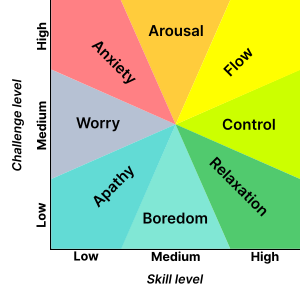
Back لا مبالاة Arabic Apatiya Azerbaijani Angoms BAT-SMG Апатыя Byelorussian Апатия Bulgarian Apatija BS Апати BXR Apatia Catalan Apatie Czech Apati Danish

| Part of a series on |
| Emotions |
|---|
  |
Apathy, also referred to as indifference, is a lack of feeling, emotion, interest, or concern about something. It is a state of indifference, or the suppression of emotions such as concern, excitement, motivation, or passion. An apathetic individual has an absence of interest in or concern about emotional, social, spiritual, philosophical, virtual, or physical life and the world. Apathy can also be defined as a person's lack of goal orientation.[2] Apathy falls in the less extreme spectrum of diminished motivation, with abulia in the middle and akinetic mutism being more extreme than both apathy and abulia.[3]
The apathetic may lack a sense of purpose, worth, or meaning in their life. People with severe apathy tend to have a lower quality of life and are at a higher risk for mortality and early institutionalization.[2] They may also exhibit insensibility or sluggishness.[4] In positive psychology, apathy is described as a result of the individuals' feeling they do not possess the level of skill required to confront a challenge (i.e. "flow"). It may also be a result of perceiving no challenge at all (e.g., the challenge is irrelevant to them, or conversely, they have learned helplessness). Apathy is usually felt only in the short term, but sometimes it becomes a long-term or even lifelong state, often leading to deeper social and psychological issues.[5][4]
Apathy should be distinguished from reduced affect display, which refers to reduced emotional expression but not necessarily reduced emotion.
Pathological apathy, characterized by extreme forms of apathy, is now known to occur in many different brain disorders,[6] including neurodegenerative conditions often associated with dementia such as Alzheimer's disease,[7] Parkinson's disease,[8] and psychiatric disorders such as schizophrenia.[9] Although many patients with pathological apathy also have depression, several studies have shown that the two syndromes are dissociable: apathy can occur independent of depression and vice versa.[6]
- ^ Csikszentmihalyi M (1997). Finding Flow: The Psychology of Engagement with Everyday Life (1st ed.). New York: Basic Books. p. 31. ISBN 978-0-465-02411-7.
- ^ a b Fahed M, Steffens DC (May 2021). "Apathy: Neurobiology, Assessment and Treatment". Clinical Psychopharmacology and Neuroscience. 19 (2): 181–189. doi:10.9758/cpn.2021.19.2.181. PMC 8077060. PMID 33888648.
- ^ Marin, R. S., & Wilkosz, P. A. (2005). Disorders of diminished motivation Archived 2012-11-22 at the Wayback Machine. Journal of Head Trauma Rehabilitation, 20(4), 377-388.
- ^ a b "Apathy". Cleveland Clinic. Retrieved 30 December 2023.
- ^ Pishghadam, Reza; Faribi, Maryam; Kolahi Ahari, Mahtab; Shadloo, Farzaneh; Gholami, Mohammad Javad; Shayesteh, Shaghayegh (29 August 2022). "Intelligence, emotional intelligence, and emo-sensory intelligence: Which one is a better predictor of university students' academic success?". Frontiers in Psychology. 13. doi:10.3389/fpsyg.2022.995988. ISSN 1664-1078. PMC 9465416. PMID 36106040.
- ^ a b Husain M, Roiser JP (August 2018). "Neuroscience of apathy and anhedonia: a transdiagnostic approach" (PDF). Nature Reviews. Neuroscience. 19 (8): 470–484. doi:10.1038/s41583-018-0029-9. PMID 29946157. S2CID 49428707.
- ^ Nobis L, Husain M (August 2018). "Apathy in Alzheimer's disease". Current Opinion in Behavioral Sciences. 22: 7–13. doi:10.1016/j.cobeha.2017.12.007. PMC 6095925. PMID 30123816.
- ^ den Brok, Melina G. H. E.; van Dalen, Jan Willem; van Gool, Willem A.; Moll van Charante, Eric P.; de Bie, Rob M. A.; Richard, Edo (May 2015). "Apathy in Parkinson's disease: A systematic review and meta-analysis". Movement Disorders. 30 (6): 759–769. doi:10.1002/mds.26208. ISSN 1531-8257. PMID 25787145. S2CID 35664376.
- ^ Bortolon C, Macgregor A, Capdevielle D, Raffard S (September 2018). "Apathy in schizophrenia: A review of neuropsychological and neuroanatomical studies". Neuropsychologia. 118 (Pt B): 22–33. doi:10.1016/j.neuropsychologia.2017.09.033. PMID 28966139. S2CID 13411386.